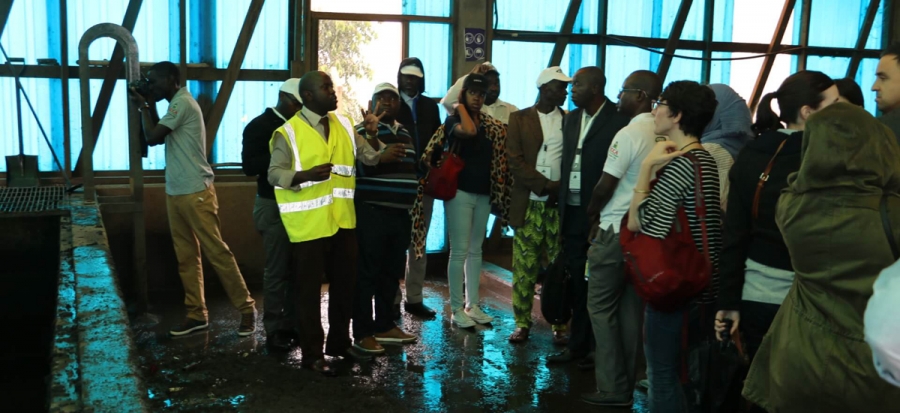Access to adequate sanitation remains a major problem for many African cities. According to the World Health Organization, nearly 520 million people do not have access to adequate sanitation facilities in sub-Saharan Africa. In an attempt to provide an answer to this major problem, the African Water Association (AfWA) initiated since 2016, with the support of the Bill and Melinda Gates Foundation, the “Reinforcing Capacity of African Sanitation Operators on Non-sewer and Faecal Sludge Management Systems through peer-to-peer Learning Partnerships Program (RASOP-AFRICA). This project aims at improving coverage and quality of sanitation service for five African cities namely Bamako in Mali, Yaoundé in Cameroon, and Yamoussoukro in Ivory Coast, Lusaka in Zambia and Kampala in Uganda.
Thus, after the first year of evaluation workshop held in Yaoundé, Cameroon in March 2017, the main stakeholders of the RASOP project met from 13 to 15 March 2018 in Kampala, Uganda, for the Year 2 review. The objective was to assess the progress made during this second year in order to identify success, weaknesses, difficulties encountered, lessons learned as well as opportunities to strengthen the achievement of project results and better envisage way forward.
Several remarks were made at the opening ceremony: Mr. Sylvain Usher, AfWA Executive Director welcomed the participants and expressed his gratitude to the Bill and Melinda Gates Foundation for his support to AfWA in his mandate for African water sector. Mrs. Danielle Pedi, Senior Program Officer at the Bill and Melinda Gates Foundation, thanked participants for their engagement before reminding the RASOP project ambition to promote the management of faecal sludge in African cities and encouraged them for better involvement in the debates, to initiate together the African revolution on improving sanitation service provision. Speaking in turn, the Mayor of the Nakawa Division, Mr. Romuald Balimwezo explained the importance of having adequate sanitation services for the health and productivity of the people. He welcomed and the idea of choosing Kampala to break event on such a burning challenge for the continent. To conclude the series of remarks, Ms. Anita Gaju, the AMCOW representative, acknowlged the importance given by her Organization for the development of sound approaches for a citywide inclusive sanitation in Africa and delivered the opening speech of the workshop.
The workshop itself consisted of on sharing experiences in implementing the project in the 5 beneficiary cities. Each of the city’s project team presented the progress made, the difficulties encountered as well as the prospects. A good note of the workshop was the participation of many technical and financial partners including a team from the African Water Facility, of the African Development Bank, representatives of the USAID-Walis program based in USA, a representative from USAID-West Africa, Centre for Affordable Water and Sanitation Technology (CAWST) in Canada and other BMGF teams. Dr. Ousseynou Guene of the African Development Bank was given the opportunity to present the African Urban Sanitation Investment Fund (AUSIF), which is the Bank's current mechanism for financing urban sanitation infrastructures in Africa. Presentations were followed by very enriching discussions from the participants, and the workshop ended with a field visit. Participants first discovered the KCCA call center which is among others tasks, is responsible for connecting household with pit emptiers and the visit ended at the LUBUGI faecal sludge treatment plant managed by NWSC where they were informed on the faecal treatment process.
At the end of the workshop, participants expressed their satisfaction with the good performance of the work done within the RASOP project. For them, the assessment of year 2 of implementation of the RASOP project is positive so far as all the planned objectives have been achieved. All the 5 cities involved are provided with a strategic urban sanitation plan (SUSAP) focus on onsite sanitation. However, the representatives of these cities are appealing donors to provide funding support to implement these SUSAP and to AfWA, they are appealing to expand the program to other African cities.

 English
English  Français
Français 
